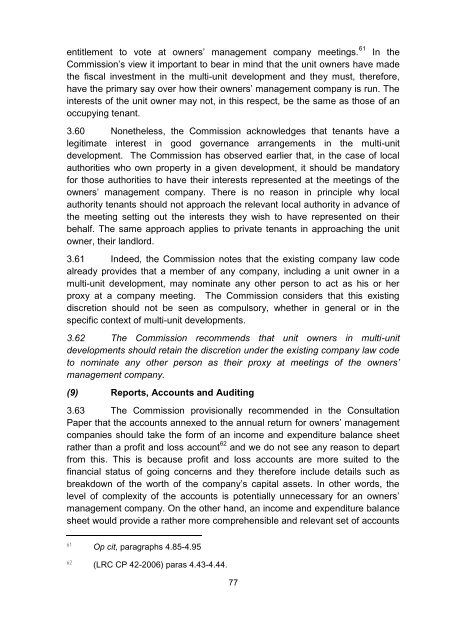Report on Multi-Unit Developments - Law Reform Commission
Report on Multi-Unit Developments - Law Reform Commission
Report on Multi-Unit Developments - Law Reform Commission
You also want an ePaper? Increase the reach of your titles
YUMPU automatically turns print PDFs into web optimized ePapers that Google loves.
entitlement to vote at owners‘ management company meetings. 61 In the<br />
Commissi<strong>on</strong>‘s view it important to bear in mind that the unit owners have made<br />
the fiscal investment in the multi-unit development and they must, therefore,<br />
have the primary say over how their owners‘ management company is run. The<br />
interests of the unit owner may not, in this respect, be the same as those of an<br />
occupying tenant.<br />
3.60 N<strong>on</strong>etheless, the Commissi<strong>on</strong> acknowledges that tenants have a<br />
legitimate interest in good governance arrangements in the multi-unit<br />
development. The Commissi<strong>on</strong> has observed earlier that, in the case of local<br />
authorities who own property in a given development, it should be mandatory<br />
for those authorities to have their interests represented at the meetings of the<br />
owners‘ management company. There is no reas<strong>on</strong> in principle why local<br />
authority tenants should not approach the relevant local authority in advance of<br />
the meeting setting out the interests they wish to have represented <strong>on</strong> their<br />
behalf. The same approach applies to private tenants in approaching the unit<br />
owner, their landlord.<br />
3.61 Indeed, the Commissi<strong>on</strong> notes that the existing company law code<br />
already provides that a member of any company, including a unit owner in a<br />
multi-unit development, may nominate any other pers<strong>on</strong> to act as his or her<br />
proxy at a company meeting. The Commissi<strong>on</strong> c<strong>on</strong>siders that this existing<br />
discreti<strong>on</strong> should not be seen as compulsory, whether in general or in the<br />
specific c<strong>on</strong>text of multi-unit developments.<br />
3.62 The Commissi<strong>on</strong> recommends that unit owners in multi-unit<br />
developments should retain the discreti<strong>on</strong> under the existing company law code<br />
to nominate any other pers<strong>on</strong> as their proxy at meetings of the owners‟<br />
management company.<br />
(9) <str<strong>on</strong>g>Report</str<strong>on</strong>g>s, Accounts and Auditing<br />
3.63 The Commissi<strong>on</strong> provisi<strong>on</strong>ally recommended in the C<strong>on</strong>sultati<strong>on</strong><br />
Paper that the accounts annexed to the annual return for owners‘ management<br />
companies should take the form of an income and expenditure balance sheet<br />
rather than a profit and loss account 62 and we do not see any reas<strong>on</strong> to depart<br />
from this. This is because profit and loss accounts are more suited to the<br />
financial status of going c<strong>on</strong>cerns and they therefore include details such as<br />
breakdown of the worth of the company‘s capital assets. In other words, the<br />
level of complexity of the accounts is potentially unnecessary for an owners‘<br />
management company. On the other hand, an income and expenditure balance<br />
sheet would provide a rather more comprehensible and relevant set of accounts<br />
61<br />
Op cit, paragraphs 4.85-4.95<br />
62<br />
(LRC CP 42-2006) paras 4.43-4.44.<br />
77

















